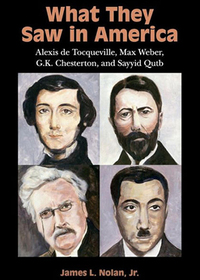
- Williams College
- Professor
- Pampusch Scholar, Residential Fellow (2012-2013)
- “What They Saw in America”
James L. Nolan, Jr. is Professor of Sociology at Williams College. His research and teaching interests include law and society, comparative law, technology and social change, culture, and comparative historical sociology.
Professor Nolan is the author of The Therapeutic State: Justifying Government at Century’s End (1998), Reinventing Justice: The American Drug Courts Movement (2001), and Legal Accents, Legal Borrowing: The International Problem-Solving Court Movement (2009). He is also the editor of two books:The American Culture Wars: Current Contests, Future Prospects (1996) andDrug Courts: In Theory and in Practice (2002). His work has appeared in a number of journals, law reviews, and edited collections including theSociological Forum, American Criminal Law Review, Society, The Hedgehog Review, The Sociological Quarterly, The Responsive Community, the Monash University Law Review, and the Oxford Handbook of Sentencing and Corrections.
Professor Nolan is the past recipient of a National Endowment for the Humanities Fellowship (1999-2000), a Fulbright Scholar Award (1999-2000), and the Herbert H. Lehman Fellowship from the Oakley Center for the Humanities and Social Sciences (2000). He has served as a Visiting Fellow at the Centre for Criminology, Oxford University (2004-2006) and as a Visiting Fellow at Exeter College (2005-2006).
Publications
-
What They Saw in America: Alexis de Tocqueville, Max Weber, G. K. Chesterton, and Sayyid Qutb
Cambridge University Press, 2016

Grounded in the stories of their actual visits, What They Saw in America takes the reader through the journeys of four distinguished, yet very different foreign visitors - Alexis de Tocqueville, Max Weber, G. K. Chesterton and Sayyid Qutb - who traveled to the United States between 1830 and 1950. The comparative insights of these important outside observers (from both European and Middle Eastern countries) encourage sober reflection on a number of features of American culture that have persisted over time - individualism and conformism, the unique relationship between religion and capitalism, indifference toward nature, voluntarism, attitudes toward race, and imperialistic tendencies. Listening to these travelers’ views, both the ambivalent and even the more unequivocal, can help Americans better understand themselves, more fully empathize with the values of other cultures, and more deeply comprehend how the United States is perceived from the outside.